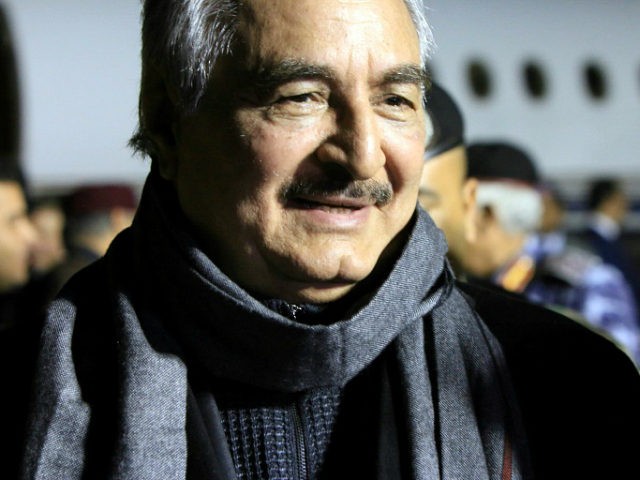Former Gen. Khalifa Haftar, the Russian-backed Libyan opposition leader who has been compared to the country’s deposed and executed dictator Muammar Gaddafi, is reportedly expected to be nominated for president in March 2018.
Gen. Haftar’s upcoming presidential run is part of an agreement he reached with Prime Minister Fayez al-Serraj of the United Nations-backed Government of National Accord (GNA) as part of peace negotiations that took place in the United Arab Emirates (UAE) on Tuesday, reports the Libyan Express.
Although Russia has hosted both rival leaders, the Kremlin is believed to favor military strongman Gen. Haftar.
Citing anonymous sources, the Libyan Express notes that the UAE-based peace talks between the two kingpins “had been successful.”
“Haftar will be nominated for president of Libya in March 2018 in an agreed on upcoming elections for president and for the parliament, the sources revealed, adding that Al-Serraj expressed satisfaction with this point.” it adds.
Libya’s eastern military commander has been ruling from Marj while the GNA chief is based in the North African country’s capital Tripoli.
The meeting between the rival Libyan kingpins ends “a 16-month standoff that has undermined diplomatic efforts to unify a country riven by factional fighting since 2011,” reports Reuters.
“Having previously spurned invitations to engage with the government, Khalifa Haftar held talks with Fayez Serraj in Abu Dhabi that one source close to Haftar said produced an agreement to hold elections early next year,” it adds.
Reuters did not mention anything about Hafter running for president in 2018.
While Moscow primarily supports Gen. Haftar, the United States and NATO back the GNA’s Serraj, according to the Carnegie Endowment for International Peace.
Since the successful U.S.-NATO-led war in 2011 to remove Gaddafi, which resulted in the death of the dictator, Libya has been gripped by political instability and deteriorating security conditions, fueled by the Islamic State (ISIS/ISIL) and other jihadists groups.
Meanwhile, Haftar has been leading armed factions in eastern Libya that reject the U.N.-backed GNA, fueling its failure to expand its reach.
Rival armed groups in western Libya back PM Serraj’s GNA.
Turkey’s TRT World has suggested Gen. Hafter may be the next Col. Gaddafi who was ultimately removed from power and executed in October 2011 with the support of former U.S. President Barack Obama’s administration.
“From the CIA’s headquarters in Langley, Virginia, to the war-ridden battlefields of Libya, General Khalifa Haftar’s turbulent journey has been filled with blood, a lust for power, and controversy,” reports the Turkish news outlet,
“Born in 1943, in the eastern town of Ajdabiya, Haftar was one of the officers led by Colonel Gaddafi in the 1969 coup which deposed King Idris from his throne,” adds TRT World. “Haftar gained Gaddafi’s trust and was soon tasked with leading Libyan forces in the conflict with Chad in the 1980s.”
However, Haftar fell out of favor with Gaddafi.
The general spent an estimated two decades “incessantly trying to topple Gaddafi from power – from exile in his home in Virginia,” allegedly with the help of the to CIA, notes TRT World.
U.S. President Donald Trump has expressed no interest in involving America in Libya’s political woes.
Last month, the president said he does not foresee a U.S. role in Libya beyond fighting the ISIS.
“I do not see a role in Libya. I think the United States has, right now, enough roles,” he said. “We’re in a role everywhere.”

COMMENTS
Please let us know if you're having issues with commenting.